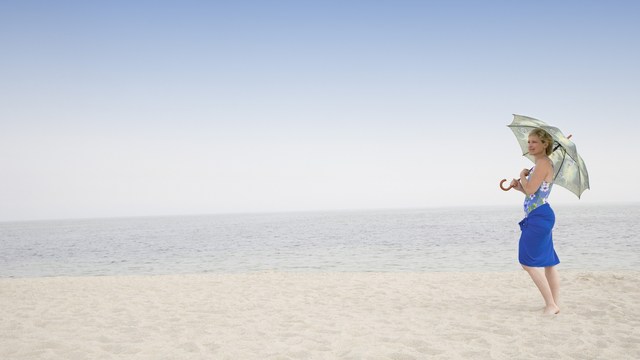 PS Productions/PhotoSpin
PS Productions/PhotoSpin
More and more Americans are becoming aware of the importance of vitamin D to our health, our bones and to our immune function. We actually absorb vitamin D through our skin from the ultraviolet B (UVB) waves of the sun. The CDC reports that over 24 percent of Americans are at risk for inadequate vitamin D levels.
One of the best ways to increase our vitamin D levels is to spend time in the sun. This is great news for anyone that likes outdoor activities ... or is it?
You might be wondering, is it better for me to stay out of the sun and be vitamin D-deficient, or hang out in the sun and get sunburn, or wrinkles -- or worse -- skin cancer?
I want to help you find the balance so that you can get enough sun to increase your vitamin D, without getting too much and increasing your risk for sunburn or skin cancer.
The sun’s rays release UV light. This stimulates the production of melanin (pigment in your skin) in your melanocytes (skin cells) causing your skin color to darken. It is the body’s way to protect itself from the damaging rays of the sun. We call it getting a tan.
UV light’s wavelengths are too short to be seen by the naked eye so we can’t tell how much exposure we are getting when we are out in the sun.
UV light can be further divided into three different bands of light: ultraviolet A (UVA), ultraviolet B (UVB) and ultraviolet C (UVC). Since only UVA and UVB reach the earth’s atmosphere these are the wavelengths that we are concerned about for tanning or sunburn.
The UVA waves are the most damaging for our skin and the ones that should be minimized and avoided. Most sun tan lotions contain protection from both UVA and UVB.
Avoid getting sun through windows because you will receive UVA rays, not UVB. Remember UVB rays are the waves help your body produce vitamin D. UVA rays just cause damage to your cells.
Protect your eyes and your face because your skin is thinner and more sensitive in those areas. It is more easily damaged and more likely to develop wrinkles.
It is good to have an umbrella available when you are at the pool or the beach or out in a high sun area.
Use non-toxic sun tan lotions but remember they do not allow your skin to increase vitamin D levels because they block UVB, too.
Don’t spend too much time in the sun without some protection. Remember, you only need up to 15 minutes of unprotected sun on your skin a day to increase your vitamin D levels. You probably get that much without trying. So protect your skin with clothes, an umbrella or sunscreen when you plan to be out for longer than 15 minutes.
Live Vibrantly,
Dr. Dae
Dr. Dae's website: www.healthydaes.com
Dr. Dae's book: Daelicious! Recipes for Vibrant Living can be purchased @ www.healthydaes.com
Dr. Dae's Bio:
Dr. Daemon Jones is your diabetes reversal, hormones, metabolism and weight loss expert. Dr. Dae is a naturopathic doctor who treats patients all over the country using Skype and phone visits. Visit her or schedule a free consultation at her website www.HealthyDaes.org/
Sources:
"Maximizing Your Vitamin D from Safe Sun Exposure." Mercola.com. N.p., n.d. Web. 5 June 2014.
http://articles.mercola.com/sites/articles/archive/2012/03/26/maximizing-vitamin-d-exposure.aspx
"Sunburn: Causes - MayoClinic.com." Mayo Clinic. N.p., n.d. Web. 5 June 2014.
http://www.mayoclinic.com/health/sunburn/DS00964/DSECTION=causes
"Vitamin D Status: United States, 2001–2006." Centers for Disease Control and Prevention. Centers for Disease Control and Prevention, 2 June 2009. Web. 5 June 2014.
http://www.cdc.gov/nchs/data/databriefs/db59.pdf
Reviewed June 6, 2014
by Michele Blacksberg RN
Edited by Jody Smith






Add a CommentComments
There are no comments yet. Be the first one and get the conversation started!